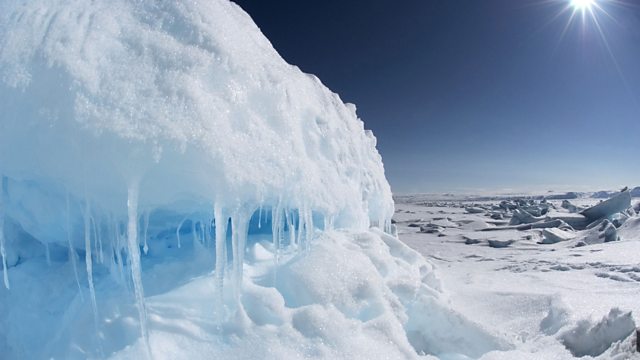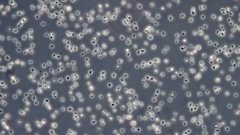Living at the Edge: Life in Extreme Environments
Extreme life and synthetic biology in the sea, on land and in space.
Bridget Kendall explores extreme living and what it tells us, from human exploration to deep sea fish and synthetic biology. Bridget and her guests explore hot dry deserts and sub-zero polar ice, deep sea vents, salt heavy lakes, acid hot springs and outer space. NASA scientist Lynn Rothschild is a pioneer in the field of astrobiology, interested in probing the limits of life on earth, to better understand where we might find life signs elsewhere in the universe. Oliver Crimmen is the Fish Curator at the Natural History Museum in London. Heβs an expert on how some sea creatures can survive both freezing and hot water β and several miles beneath the surface of our oceans. And explorer Rosie Stancer takes her own body to the edge β with solo trips to both the South Pole and the Arctic North, and a new expedition planned across Chinaβs largest desert.
(Image credit: Science Photo Library)
Last on
More episodes
Previous
Clip
-
![]()
Indestructible organism
Duration: 00:35
Dr. Lynn J. Rothschild
Dr Rothschild is passionate about revealing the meaning of life in its environment on earth or elsewhere in the universe, while at the same time pioneering the use of synthetic biology to enable space exploration. She believes that just as travel abroad permits new insights into our home, so too the search for life elsewhere has allowed a more mature scientific, philosophical and ethical perception of life on Earth.
She is an evolutionary biologist and astrobiologist at NASA's Ames Research Center.
At Ames, her research has focused on how life, particularly microbes, has evolved in the context of the physical environment, both on Earth and potentially beyond our planet's boundaries. She is a founding figure in the field of astrobiology where her current research includes examining a protein-based scenario for the origin of life, hunting for the most radiation resistant organisms, and determining signatures for life on extrasolar planets. Her lab is also now working on the use of synthetic biology for NASA.
Oliver Crimmen

Oliver Crimmen is the Fish Curator in the Vertebrates Division of the Natural History Museum. He has been at the Museum since 1973, joining when he was just 19. He is responsible for preserving one of the most important fish collections in the world, which includes around 750,000 specimens.
Photo: The angler fish Oliver brought into the studio.
His stand out moments working at the museum with incredible underwater creatures include βHelping with large specimen preservation projects such as the Thames whale, the giant squid, and working with Β British artist Damien Hirstβs large shark artworksβ. Last year Oliver went into work and found a fish had been named after him. P. olliei, which lives in the torrential mountain rivers of Myanmar and clings to cliffs with its modified fins in a feat of extreme survival.
Ollie has also collaborated with a major swim suit manufacturer on a hydrodynamic swimsuit, using sharkskin to reduce drag while in the water. The project brought together expertise from the scientific, artistic and commercial world.
Rosie Stancer
Since 1996, Rosie Stancer has been a polar athlete and explorer. In 2003 she skied solo to the south pole in just short of 43 days, beating previous speed records by a week, all whilst hauling a sledge more than twice her weight.
In 2007, she was very close to being the first woman to reach the North Pole on a solo mission, only to be thwarted by news that her pilots would have risked their lives on the fast melting ice, had they picked her up from the actual pole. She also amputated two of her own toes without anaesthetic during the ill-fated mission.
For 2016, she has plans to trek 1,000 km through the Chinese Taklamakan desert, the translation of which is βthe desert you go in and donβt come outβ.
She is also a wife and mother of three and stands at 5β3β or 5β4β, depending on the report. Her small stature is often emphasized in contrast with the archetype of a towering bearded male explorer. She is the great-niece of the Late Queen Mother and through her husband related to Sir Ernest Shackletonβs geologist, Jock Wordie.
She has previously been described as a βcross between Tinkerbell and the Terminatorβ. She works with the charity Special Olympics UK.
Broadcasts
- Mon 4 Apr 2016 01:06GMTΒιΆΉΤΌΕΔ World Service except Americas and the Caribbean, Australasia & News Internet
- Mon 4 Apr 2016 04:06GMTΒιΆΉΤΌΕΔ World Service Americas and the Caribbean
- Tue 5 Apr 2016 08:06GMTΒιΆΉΤΌΕΔ World Service except News Internet
- Tue 5 Apr 2016 23:06GMTΒιΆΉΤΌΕΔ World Service except News Internet
- Wed 6 Apr 2016 01:06GMTΒιΆΉΤΌΕΔ World Service Australasia
Podcast
-
![]()
The Forum
The programme that explains the present by exploring the past



